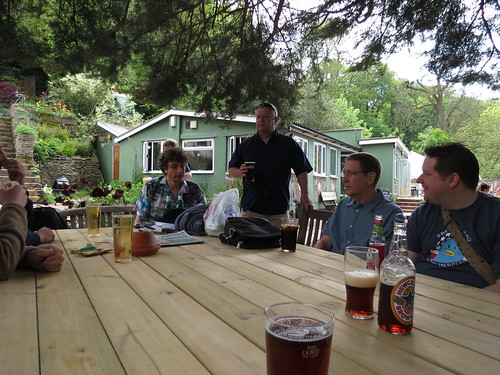I'm sorry - I just couldn't resist that headline. I finished laying tiles in the conservatory yesterday afternoon and I'm leaving everything to dry for a few days before I grout them. I'll post a photo of the results when I'm done, but I reckon it'll look pretty good.
I arrived at last night's Colston Hall gig in time to catch the support act. To quote his website, Jeff Carey "makes hardcore digital noise music with a joystick, a gamer keypad, and an array of strobe lights." The experience was not unlike seeing Nine Inch Nails bing fronted by Morbius's Monster from the Id. Like Matmos, Carey hails from Baltimore. He gave us lots of subsonics, flanging and phasing white noise and staccato bursts of static, all controlled in an extremely dynamic and physical performance. It was brutal, loud, in-your-face noise and together with the stark, strobing light show it was a very trippy experience. He described the concept as "like the music Deckard would hear in Blade Runner if he'd gone to a punk club afterwards." He also gave shout outs to Forbidden Planet and Space: 1999, which made me smile. It wasn't to everyone's taste, though - half a dozen people walked out. It wasn't all full-on noise; Jeff would occasionally drop in some cavernous reverberation effects which gave the pieces space to breathe. Nevertheless, this sort of strong medicine is best taken in small doses, so he finished his set after twenty minutes. I was impressed enough to buy his album Interrupt-Decay afterwards. That's really going to kick things off at my next party.
Matmos's set was experimental and unrehearsed. It was the first night of their Eurpean Tour, too. "And we're all jetlagged wrecks," M. C. Schmidt explained. The stage lights were turned down low, the back projection switched on, and they began with a piece set to prerecorded video of recited text (and for the life of me I can't remember the author of the piece being read out). Words were split up, played forwards and backwards, and the rhythm track materialised around everything in a way that seemed effortless although there was a lot of frantic work going on as the band manipulated gear on two tables that were completely covered in mixers, vintage synthesisers, laptops, and arcane pieces of electrical equipment.
One track was built up entirely from the clicks of a metronome that Drew set running at the front of the stage with a webcam pointing at it. Each piece was surprising and entertaining and built more or less from the ground up as we watched. But I was in for an even bigger surprise. For one piece, Martin was making lots of ridiculous noises with a big roll of sticky tape which were being fed into their processing chain for Drew to mangle. He'd pull out a length of tape close to the mic to pick up all the noises it made, which were then looped in time to the track. It sounded a bit like the track Stupid Fambaloo from the album Quasi-Objects (although that was made by blowing up a balloon). As the track progressed, the beat got funkier and the sounds got crazier and crazier and Martin was wrapping the tape round himself to keep it out of the way. Like I said yesterday, when Matmos get going they can really swing, and I was really enjoying the music. But I was more than a little taken aback when Martin walked to the front of the stage, raised his eyebrows, and *handed me the tape*. I held one end while he plucked, crunched and squeaked the other. Then he pointed to the back of the hall, so I got up and pulled the tape out as I walked backwards down the centre aisle. I ended up halfway to the back of the auditorium holding one end of the tape while he played it like a very very low bass string.
I got to chat with them afterwards. "The tape has become a bit of a thing," Martin explained. "You can't do it in New York. People start wrapping each other in the stuff." I filled a few gaps in my Matmos collection and bought a t-shirt on my way out, and was grinning all the way home. Not the evening I was expecting, by any means, but pretty bloody cool eh?
This morning I'm listening to the back catalogue of albums by the band Matmos. I was surprised just how many albums of theirs I have in my collection: ten of them. At the moment I'm listening to the track Tunnel from their latest album, The Marriage of True Minds, which came out last year. It really thumps along, and I love the unexpected ending. The band took a rather unusual approach to recording this album: they set up a Ganzfeld experiment and asked the test subjects to try and receive telepathically the basic structure of each track on the album that had been mapped out beforehand. Then they recorded each track based on what the test subject responded with. Brilliant.
Matmos have always taken a somewhat esoteric approach to music making. Their EP Rat Relocation Program features recordings of the band catching a rat that kept breaking into their San Francisco apartment and stealing food (they released the rat, unharmed, outside town.) The 2001 album A Chance to Cut is a Chance to Cure is made up of sound samples of surgical procedures. The track The Struggle Against Unreality Begins off their The Civil War album has a rhythm track which is an ultrasound recording of blood flowing through M. C. Schmidt's carotid artery. Their esoteric approach to music caught the attention of Bjork, and the result was her album Vespertine. Despite their very digital approach to composition, their music has a fantastic groove. Thought-provoking stuff that really swings - what's not to like?
Best of all: tonight I'm heading off into Bristol to see them perform live at the Lantern in the Colston Hall, and I am really looking forwards to it.
Last year I helped crowdfund an album by Markus Reuter which featured a live performance by the Colorado Chamber Orchestra of his algortithmic composition Todmorden 513. It's a fascinating piece of music and it's become a favourite of mine for late-night listening.
I'm delighted to be able to tell you that the commercial release has now been announced, and you'll be able to buy the album on Amazon or Bandcamp from June 17th. Do your ears a favour and get yourself a copy! Here's the link:
Well, I jinxed it - just not in the way I thought. I was still awake at 2 am this morning, tossing and turning, trying to get comfortable and doing my best to ignore the stabbing pain in my right knee. Even with a soft mat between me and the conservatory floor, all that kneeling down had taken its toll and last night my legs were really letting me know about it.
Then this morning I discovered that the cheap tile cutter blades I bought for my jigsaw don't fit it. I can't face cutting the tiles by hand with my ancient hand tile saw. Apart from anything else I'm a fussy bugger, and the cut you get with a tile saw is nowhere near as straight as you get with a jig saw. I'm going to have to get the right blades for the saw. Just - not today. I'm limping about like an old crock, so when the blog's done I shall retire to my armchair, give my legs a rest and read a book instead.
Here's a nice explanation of the Fermi Paradox, courtesy of Gizmodo. It's all grist to the mill for anyone who enjoys reading science fiction, but we still don't know the answer to Fermi's original question: "Where is everybody?" There are lots of Earth-like planets out there, and some of them are a lot older than our Earth. If intelligent life evolved on a proportion of those planets, and if some of that life developed civilisation, and spaceflight, then we should have encountered evidence of them by now. Plug even a conservative set of numbers into what's known as the Drake Equation and you come up with an answer much larger than 1 (where an answer of 1 would mean "it's just us.") If it isn't just us, where's everyone else? Why haven't they stopped by for a cup of tea, or left unequivocal evidence of their visit?
Tim Urban's article sets out how we might detect other civilisations. The main way is by detecting the waste heat of industry on truly mind-boggling scales. He covers the different levels of a civilisation's energy usage that were set out by Igor Kardashev back in the 1960s, starting with a humble intelligence that merely uses all the energy from the local star that falls on the surface of its home planet. We're nearly at that stage ourselves. The next step up is to use an equivalent amount of energy to the local star's output, the Dyson Sphere approach. Once that becomes old hat and you need even more energy, you move on to a strategy that would be really noticeable from elsewhere: harnessing the power output of an entire galaxy. But so far, nobody has detected a Kardashev type III civilisation (or a type II or even a type I).
Why might this be? Urban provides a decent summary of Robin Hanson's concept of the Great Filter, an unanticipated and unknown catastrophe that befalls almost (or all) developing civilisations and prevents them from colonising the galaxy. If the Great Filter exists, we have no idea what it might be. More worryingly, we don't know if we passed our own Great Filter some time in the past or if it lurks, unseen, in our future like some cosmic fly swatter. There are other, even weirder issues out there too - I blogged last year about a paper by Sharov and Gordon which applied Moore's Law to the complexity of life. They came to the conclusion that life on Earth originated 9.7 billion years ago, which is a bit of a problem seeing as how the Earth is only 4.5 billion years old. Oops.
Karl Taro Greenfeld writes about Faking Cultural Literacy in the New York Times. He's an entertaining writer, and here he absolutely skewers the modern approach to bluffing:
"Whenever anyone, anywhere, mentions anything, we must pretend to know about it. Data has become our currency."
I really wish Stephen Potter was still around as he would recognise this trait instantly. We never admit to not knowing what the conversation is about, because that would mean we'd been one-upped. The thing is, these days we don't have to admit anything. Social media deluges us with so much cultural information that it no longer matters whether or not we actually sat through the last episode of Game of Thrones or Agents of SHIELD, whether we know who Kanye West or Kim Kardashian are, or what they do; we will be able to pass comment about such things because we have encountered so many comments about them in passing on Twitter or Facebook, seen so many animated gifs on Tumblr or Reddit, and seen enough clips on YouTube or Vimeo that we can maintain a conversation about them regardless.
I'll say right away that I'm guilty of doing this from time to time. I'm fanatically interested in a variety of aspects of modern culture, just - well, just not all of it. Sometimes it's easier to just nod and agree rather than tell someone that what they're talking about holds no attraction for me whatsoever. The thing is, if an aspect of culture engages my curiosity, I take great pains to become familiar with the subject. If it doesn't, then I just ignore it.
I consider myself to be more culturally literate than average. For example, I can write here that I first discovered Greenfeld's writing in the 90s when I read a book of his called Speed Tribes (which was subsequently namechecked by William Gibson in the "thanks" at the beginning of his novel Idoru). I even wrote a song inspired by the book. Some aspects of popular culture are just fine with me. I've really enjoyed Agents of SHIELD. I've just finished re-reading George R R Martin's A Song of Ice and Fire books (and as a result I really want to read The Winds of Winter right now). But ask me to hum anything written by Jay-Z, or even name one of his albums? Explain exactly why Snooki appears on television as regularly as she evidently does? Tell you the plot of the latest Dan Brown novel (assuming there actually is a plot this time)? No can do. Not interested. And after reading Karl's article, the next time I find myself having a conversation about such things, I may well come straight out and admit it. Get off my lawn!
I've spent quite a lot of time over the last week on my hands and knees, and I ache all over. Why? Because I've been laying down a tiled floor in the conservatory...
This is probably going to jinx things, but I've only had to discard two tiles so far. That's extremely good going for me. Provided that nothing goes awry I reckon I'll have the final tiles cut and laid tomorrow, then all that's left to do is the grouting. It doesn't look too shabby, if I say so myself. It's been a long time since I did any tiling and it took a while to remember what it was I was supposed to be doing, but I'm pleased with the results. However, please take note: I won't be looking for other tiling jobs when this one's done. My shoulders have been throbbing gently all week and every time I move, the shooting pains going up my legs confirm that my decision to avoid a career in home improvements was the correct choice to make.
The BBC's Springwatch is back on the air, and this time they're broadcasting from the RSPB's reserve at Minsmere in Suffolk. I've spent some very happy hours there (Minsmere's where I first saw an osprey and a spoonbill, amongst others) and it's great to see the place looking so good on camera. Things might be a little damp over there this evening, though - Suffolk has had over an inch of rain in the last 24 hours and it shows no sign of stopping.
I'm back on my diet, and today is a fast day. To take my mind off food, this morning I gave the espresso machine its first descale of the year. This is part of a trend that's arisen over the last week or so: I've made a start on sorting out the house. The living room hasn't looked this tidy since Christmas, and the dining table is clear of the piles of papers, files and notebooks that have been cluttering it up for months. I could actually eat off it - oh wait, it's a fast day.
I've recycled the junk mail and the election leaflets. I've shredded loads of stuff I no longer need, and put away the stuff that I want to keep. I need to do the same thing upstairs, too: it's time to declutter, and declutter in a big way. I'm rather enjoying it, too.
A ""zealot … so ideologically obsessed with his free school experiment [that] he's willing to see children struggle to get suitable school places". That's a description of Michael Gove, our education secretary, by someone in his own government department. Projected spending on Mr Gove's "free schools" experiment is expected to exceed its budget by £800 million by 2016; a sponsor for six school academies in Devon, Gloucestershire and East Sussex announced this week that it is closing down; relations between the Lib Dems and the Conservatives over education are described as "fraught". Mr Gove seems to think he knows best how teachers should teach, and new policies, guidelines, rules and curricula come out with stultifying regularity. But in Finland (where student performance frequently comes top in international rankings) the approach is very different. The minimum qualification for a teacher is a master's degree and the government hasn't changed the approach in forty years: teachers are left to get on with the job. The "hands off" approach is intentional, as this encourages teacher autonomy. Arwyn Jones observes in his report that Finland has low levels of poverty. The question is, is this helping Finland's educational excellence, or is it a result of it?
Some American audiences don't take kindly to suggestions that they're not the best at absolutely everything, which is probably why the latest statistics on the educational performance of students (and adults) in the USA ended up being provided by a Canadian magazine. The results are depressing. Over half the people who were asked whether they thought the Big Bang actually happened said that it didn't; only a third accept that climate change is caused by human activity; nearly a quarter haven't read a single book in the past year.
There's a bug going round at the moment and today I've got clogged sinuses and blocked ears. That means it's time to lay off wearing headphones for a few days, which is a pain. What I need is a pair of speakers like the ones Chichester College had set up last week for their talk by legendary record producer Ken Scott.
His talk was titled "From Abbey Road to Ziggy Stardust" and covered his early career as a sound engineer at Abbey Road studios in London, where he worked with the Beatles, Pink Floyd, David Bowie and the Jeff Beck Group as well as other acts like Peter Sellers and Joan Sims (!). We got to hear stories about working with the Beatles and how, together with Pink Floyd, they changed the way (and the hours) that people worked in the recording studio. We got to hear how tracks were built up before the days of 32- or 48- track tape machines (and how bouncing down didn't always go according to plan!) He played us isolated tracks from songs, and explained, for instance, how George Harrison put together the song What Is Life on his 1970 solo album All Things Must Pass.
He also talked about his subsequent move to Trident Studios, where he worked with Bowie on Pinups and Aladdin Sane. He was effusive in his praise for Bowie: 95% of the vocal tracks that Bowie used on those albums were the first (and sometimes the only) take made. He played us some of those isolated vocal tracks. The raw emotional power was amazing, particularly the vocals at the end of "Five Years" (the opening song from Ziggy Stardust). At this point, Mr Scott started the "grumpy old man" part of his talk, which he had warned us about in advance.
"But," Mr Scott said, "no record company today would accept that performance." It's not just the excessive use of Autotune (which, he explained, was originally a software package developed by oil companies to use seismic data to search for oil), or even the propensity for some artists to record each section of a song once and then cut-and-paste it in wherever else it's needed, nor is it the way that rhythm tracks are obsessively recorded "on the grid" - losing any soul or dynamism in the process (and he played us some of Chalie Watts's drumming as an example of someone who was about as far "off the grid" as you could get, but who played exactly what the song required). It isn't even the fact that record companies need to play it "safe" and a quest for audio perfection, ironing every little wrinkle, pop or miscue out of the equation (at this point he showed us a couple of video clips of live performances from Justin Bieber and Britney Spears which are about as far from live as it's possible to get). It isn't any one of those things in isolation. It's all of them.
To cheer us up, Mr Scott also talked about his move into Jazz Rock (after hearing Elton John rave about the Mahavishnu Orchestra whicle he was working with him in France) and told a very funny story about John McLaughlin's penchant for performing at high volume. Three hours went by in no time and I loved every minute of it.
The weather this weekend has been spectacularly good. The temperature in the conservatory was over 29°C on Thursday and even though it's just a little after 9am and the windows have been open for over an hour, the temperature in there right now is closing on 23°C. At one point in the last couple of days, the temperature in there hit 33°C. Outside, there isn't a cloud in the sky.
On Friday I met up with the folks where I used to work for our leaving do. We chartered a boat to take us from the centre of Bristol to Beese's Bar and Tea Gardens, cruising around the harbour...
...passing the Thekla, a music venue for the past 30 years or so which was founded by Ki Longfellow as something to keep her husband Vivian Stanshall occupied...
The Thekla has its own iconic piece of Banksy graffiti, although this is the second version; Bristol's harbour master took it upon himself to paint over the original, which did not go down well with the Thekla's owners. Luckily the artist replaced the artwork before things escalated...
...then we headed east along the River Avon past some of Bristol's older, industrial neighbourhoods. The river was the primary means of transport for a lot of the city's businesses in the 19th century and that legacy still shows, even if many riverside properties have been regooded into desirable apartment blocks.
But less than a mile later, the landscape has changed dramatically...
Once we'd safely disembarked at Beese's, we found a table in the shade of a large tree in the garden and stayed there until it went dark, chatting and quaffing the occasional beer (or soft drink, for the drivers amongst us).
The evening ended up back in Bristol where a few of the diehards paid a visit to the Small Bar in King Street. Things were a little hazy by this point, but I do remember sampling a couple of really interesting beers under the tutelage of my colleague Steve Miles, who made some excellent choices of beverage. That was an extremely pleasant day, even if I may have been a teensy bit hung over on Saturday morning!
I've managed to catch up on a few films this week. I missed Skyfall when it came out at the cinema, but I've now added it to my collection of Bond films on BluRay after picking up a copy at HMV for under a tenner. I really enjoyed it. It's a far more coherent film than Quantum of Solace, which for me was one of the weakest Bond films I've seen for many years. And now I know what Skyfall actually is (and a title that is actually relevant to the plot of the film is not something that the Bond films are renowned for). Daniel Craig excels as Bond, particularly the physical wreck that he is for most of the first act. The supporting cast are excellent, and Ben Wishaw makes a fine Q even if his costume channels Maurice Moss from the IT Crowd.
I was far less impressed by X-Men: First Class. Michael Fassbender acts everybody else off the screen, but he - and the movie - completely goes to pieces in the third act, when James McAvoy's band of unhappy mutants must avert Marvel's version of the 1962 Cuban Missile Crisis. As soon as Fassbender puts on Magneto's helmet he turns into Bono. Why a German concentration camp survivor should suddenly develop an Irish accent is completely mystifying, even though Mr Fassbender does have Irish and German parents.
Even more mystifying is the naval bombardment that Magneto subsequently manages to avert using his superpowers: despite us being shown battleships firing fifteen-inch guns directly at the shore, we are then treated to a far more spectacular depiction of 70's era missiles such as the Harpoon and 80s-era cruise missiles including the Tomahawk flying vertically up into the air and then raining down on the heroes. Other goofs include the young Professor Xavier somehow managing to have a photograph of Einstein by his bed a full three years before that particular photo was taken, and the Russians using a British registered Bell-47 helicopter to take Emma Frost to the Russian general deep within the USSR. Uncanny.
As is customary every year, I spent last night sitting on the sofa with Tweetdeck running on my laptop, the TV set to BBC1 HD and the surround sound system cranked up. It was the Eurovision Song Contest, an event that I used to greet with the refrain "oh, not again" and then strenuously avoid. But somehow the advent of social media like Twitter has turned it into one of the year's few can't-miss television events. Watching it as a stream of comments filters through my social media feeds is a profoundly 21st-Century experience, one that I share with a truly global selection of friends. It doesn't matter whether they are from Essex or Greece, whether they are librarians in Denmark, graphics artists in London and Manchester, computer programmers in Washington State, or musicians in Surrey, Nottinghamshire, Amsterdam and Iceland; they are all there on the sofa with me, and the party lasts all evening.
As for the music - well, voting blocks and politics mean that "traditional" approaches to songwriting really won't cut it any more. It's the left-field approaches that stand the best chance of winning the day, and if even your appearance can provoke a reaction of "WTF?" then you're in with a chance. That was certainly the case with Lordi, who walked away with the contest back in 2006 with their song Hard Rock Hallelujah. So the shrewd ones last night had their eye on Austria's Conchita Wurst, and as she delivered a pretty listenable movie-theme ballad that had the audience singing along, I reckoned they were probably right. And once the voting got under way, it soon became evident that they were. Austria won by a margin of 52 points, which was twelve more than the total number of points awarded to Molly, the UK's entry.
The Netherlands had foolishly decided to send a couple of proper musicians along, who'd even been to Nashville as part of their preparation. They came up with a sweet alt.country piece that reminded me of Calexico, and if the contest was truly about music they would have won. For sure, the chord progression had a lot of people making comparisons with the Police's "Every Breath You Take" but even so, the Common Linnets ended up in a well-deserved second place. Sadly, most of the other acts had focussed more on quirkiness than songwriting. Thanks to the Ukrainian entry and Twitter I now know that the Icelandic for "hamster wheel" is "þvottavél en hamstur" but I couldn't even begin to tell you what the song was like. Stage props were a Big Thing this year. Greece took things a step (or maybe a bounce) further and had a trampoline on stage, Azerbaijan went for a trapeze act, Romania brought on a circular keyboard that singer OVI pretended to play in a far from convincing manner, and Iceland plumped for brightly-coloured suits that drew rather unkind comparisons with the Teletubbies. I shouldn't complain about costumes, though; Molly and her cohorts appeared to have raided the wardrobe for Mad Max 2. It took me several minutes to realise that the Polish entry (which was excruciatingly bad) had switched to singing in English; perhaps I was distracted by something. Italy's entry was a decent stab at writing a track for Garbage to perform, but it was hardly original and a good sixteen years late. France's entry only goes to show that we need an international treaty to ban people rapping in French. The performance seemed to be more about the clothes and the haircuts than the music and the only thing they had going for them was that they appeared to have Weird Al Jancovic playing bass. "Moustache" finished in last place with just two points, which was two more than it deserved.
This morning I awoke without a trace of a hangover. I'm not sure how I dodged that particular bullet, although the toasted cheese and ham sandwich I made before going to bed may have helped. But I have been chilling out by listening to the mellow ambient sounds of my friend Norm, who uploaded a new track to Soundcloud this morning. I listened to his whole stream, and really enjoyed it. If you like old-school synthesis, you'll love it. Give it a listen!
Rob will be walking 10 peaks in 10 hours in the Lake District next month to raise money for the Multiple Sclerosis Society. It's a subject that's very close to our hearts, and he's looking for sponsors. If you can help him out with a contribution, please do so.
Now that I find myself with some free time, I've been catching up on a lot of reading. At the moment I'm working my way through George R R Martin's Song of Ice and Fire books again, and as they weigh in at around 900 pages each I'll be doing so for a while yet. This time around I'm finding it easier to concentrate on the threads of narrative for each character; this may be because I'm more familiar with the characters, but also I've noticed over the last couple of weeks that with sleeping better my powers of concentration are improving. With a work as monumental as this, you need to have your wits about you. Having said that, I will be happier when the final novels are published and I can get through the whole thing. I'll probably start again from the beginning when that happens.
I'm also reading Ann Leckie's excellent debut novel Ancillary Justice, which has just won the 2014 Clarke Award for the best science fiction novel published in Britain. The writing is extremely interesting - the central character's background plays with the "unreliable narrator" approach in such a way that even the gender of individual characters can't be relied on as being accurately identified. That enables the author to ignore - or soundly mess with - gender roles and stereotypes. Couple this with a cracking plot about a heroic protagonist laid low, seeking justice for the treachery that took everything away, and you have a work that effortlessly takes you into a truly different headspace, where even something as simple as buying a drink can become a profoundly weird experience. Which is just what SF at its finest should do.
I've been reading a fair amount of non-fiction, too. I bought Jonah Lehrer's book The Decisive Moment because I thought I was getting an interesting work on the neural basis of the decision making process, but once I sat down and started reading I discovered that what I'd actually bought was a gee-whiz self-help book. The first half of the book uses neurological terminology and "it happened to me" stories to persuade you that you should "listen to your emotions" when you make snap judgments, and the second half of the book uses exactly the same technique to tell you that you shouldn't. Very disappointing. Luckily I've also been working my way through some of the standard texts in educational psychology and Abraham Maslow's Towards a Psychology of Being is a classic examination of what motivates us to get out of bed each day and do what we do. If you're a computer nerd, you've no doubt seen modified versions of his hierarchy of human needs pyramid, but this book sets out the thinking behind that simple diagram in more detail.
I've also been filling in gaps in my Fortean Times collection. I've been a subscriber for several decades, and bought issues even before then, if I managed to find them. FT is the only magazine that I find impossible to resist. When each issue comes out, I read it avidly from cover to cover, and I keep every copy for reference. You never know when the Mongolian Death Worm is going to crop up in conversation, after all. I'm not alone in my obsession, either; the latest issue has a story from Paul Giamatti who is also a subscriber, and William Gibson's fondness for phenomena such as tulpas meant I'd twigged him as a reader long before he went on record to describe the publication as his favourite magazine.
Back in the 90s FT published collections of the really early issues, and although I bought three of these when they came out, I missed a couple, so I've been trawling the internet to find copies. This morning the postman delivered "Diary of a Mad Planet", which collects together issues 16-25 so I will be curling up in my armchair later on to luxuriate in Fortean weirdness from June 1976 to Spring 1978. I've also tracked down a copy of the book collecting issues 26-30, which should also be winging its way to me in the near future. I've got a few copies of FT when it was published regularly in its smaller format, and I have just one gap in my collection from issue 59 onwards (which came out in September 1991). I'm hoping that the missing issue will arrive this week. Who knows what new tales of strange deaths, urban weirdness and breaking paradigms I will come across as a result? One thing's for sure: they'll end up being mentioned in the blog.
There's a steady drizzle falling on the roof of the conservatory so I'm staying inside today. It's going to be a day for listening to and making music, I think. I started by listening to BBC6Music, where Lauren Laverne played a set of music produced, written or performed by Brian Eno. Listening to An Ending (ascent) reminded me why it's one of my favourite pieces of music, ever.
At the moment I'm listening to Sultry Kissing Lounge by Markus Reuter, which was recorded during the recent Crimson ProjeKCt tour. When Markus asked on Facebook if anyone would be interested if he released the music commercially, I was one of the first 100 to sign up; I love this sort of stuff. Today the album was released. It's a collection of improvised soundscapes, each performed live on solo Touch Guitar, an instrument designed and built by Markus himself. Markus started studying with Robert Fripp in the 90s but although you can hear Fripp's influence in the music, Markus has his own sound and approach to music, as evidenced by his recent issue Todmorden 513. In Sultry Kissing Lounge, delay lines help to build up reverberating layers of sound which can then be soloed over or manipulated by further effects processing, resulting in complex washes of sonic goodness that loop and return, build and fade, rise and fall and continually surprise. Here's a preview of the album:
The album was named by Julie Slick, the Crimson ProjeKCt's bassist, and the title might go some way to explaining why each track bears a girl's name... The thing that strikes me most as I sit here listening is the variety of the performances. It would be easy to play a similar piece each night, but Markus didn't do that. Some pieces are happy and celebratory, others have melancholy undertones and some are dark enough to remind me of the ominous power of the Robert Fripp String Quintet's Threnody for Souls In Torment (which is another of my all-time favourite pieces of music). Not every touring musician can produce a first-class album of material from impromptu performances live on stage, but Markus has done exactly that - this sounds more like it was crafted in a state-of-the-art studio over many months. It's going to bear repeated listening on headphones as well as over speakers, too, I think. Very highly recommended.
When I've finished listening to Markus's album I'll be firing up the studio gear and continuing to get to grips with EZDrummer 2, which I installed yesterday. My initial impressions are very good indeed. I like the tweaks to the user interface, and the addition of preset effects chains that can be applied to the existing kits I have from the original EZDrummer install gives a huge range of new sonic possibilities, even before I start investigating the two new kits that come with the upgrade. The "vintage" drum kit has a preset called "Levee" and yes, it does a fair job of duplicating John Bonham's thunderous sound from the Minstrel's Gallery at Hedley Grange. Other presets recreate the vintage studio sound of the 60s, the gated "thwack" that defined so many songs in the 80s, the dry, compressed sound of 90s grunge and more, and it's going to be a doddle creating tracks that range from saccharine pop to distorted industrial.
Toontrack have obviously been giving a lot of thought to how their software can support the songwriting process. Pick one midi groove, and EZDrummer 2 will suggest other grooves that go with it, all categorised into intros, fills, bridges, choruses and endings. You can even apply one of a selection of basic song structures to a groove with a single click. If you like a basic rhythm but think it isn't busy enough, you can make it more complex by clicking on other drums or cymbals and "suggesting" - I know it's a piece of software, but no other word explains the concept as effectively - that they be included. Toontrack's proprietary algorithm figures out where a real drummer would play the other drums, and does exactly that. The results are spookily convincing. I'm itching to try writing something with it, because it makes the job of coming up with a drum track that sounds like a coherent performance much easier. Whatever I come up with for the 50/90 challenge this year, it's going to have a decent drum sound on it, that's for sure.
Yesterday was my last official day working at Selex, although I spent it at home doing mundane bits and pieces of administrative trivia - my last actual day in the office was Tuesday. My first day as a gentleman of leisure didn't get off to a particularly auspicious start this morning, as I woke up to the news that Bristol's rather more famous Chris Harris has died.
I think it's going to take a while before I can unwind, as at the moment most of my thoughts still revolve around work. You don't stay in one job for nineteen years and walk away overnight. I put a lot of time and effort into what I do and letting go of all that is, frankly, going to be tougher than I expected. But I'm in the fortunate situation where I have time to take stock and figure out what I want to do next without worrying about where next week's meals will be coming from and I need to put a little distance between myself and the office before I make any of the big decisions. So I will be taking some time out to think about where I go from here.
Lunch today is a 40-calorie cup-a-soup. I discovered when I weighed myself at the weekend that I have drifted back to the wrong side of 14 stone. I've skipped several fast days recently and I've been eating supermarket pizza and drinking beer rather than cooking for myself and watching the calorie intake. While I might have had an excuse for this last month, it can't continue, so this week I've returned to the diet regime with a vengeance.
Before you ask: yes, I've already discovered just how unrelentingly awful daytime television is. It's only when you're on a diet that you realise just how many television programmes are about food and cooking. Well, the ones that aren't to do with selling antiques or remodelling or buying houses, anyway. About the only things I'm watching these days are Mythbusters and reruns of Star Trek. Still, this means that I'll be spending more time doing things that will pay off, like writing, or editing my CV, or practising. This is a good thing.
Back in February I asked the question, Are You Metal Enough? Take it from me, this Old Norwegian Short Tail Landrace is more metal than you or I will ever be.














